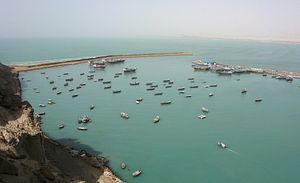Speaking on background Tuesday, a U.S. State Department spokesperson said that Secretary Mike Pompeo had approved carving an exception from sanctions for Iran’s Chabahar port.
According to The Hill, the spokesman said:
After extensive consideration, the secretary has provided for an exception from the imposition of certain sanctions under the Iran Freedom and Counter-Proliferation Act of 2012 (IFCA) with respect to the development of Chabahar Port and the construction of an associated railway and for the shipment of non-sanctionable goods through the port for Afghanistan’s use, as well as Afghanistan’s continued imports of Iranian petroleum products.
On November 5, the United States imposed what the Trump administration has touted as the “toughest ever” sanctions on Iran. The sanctions are aimed to hit not just Iran’s energy sector but also its financial, shipping, and shipbuilding sectors. U.S. sanctions had been lifted under the auspices of the 2015 Joint Comprehensive Plan of Action (JCPOA or, more simply, the Iran nuclear deal) negotiated by the Obama administration along with China, France, Russia, the U.K., Germany, and the European Union. In May 2018, however, Trump withdrew the United States from the agreement, making a return of sanctions all-but-inevitable.
As the U.S. sanctions snapped back into place, Washington issued what Pompeo called “temporary” exemptions for eight countries (China, India, Italy, Greece, Japan, South Korea, Taiwan, and Turkey).
“Each of those countries has already demonstrated significant reductions of the purchase of Iranian crude over the past six months,” Pompeo said, “and indeed two of those eight have already completely ended imports of Iranian crude and will not resume as long as the sanctions regime remains in place. We continue negotiations to get all of the nations to zero.”
As noted in a Center for Strategic and International Studies (CSIS) report released before the exemptions were announced, Japan and South Korea have both zeroed out their imports from Iran. Meanwhile, the report also noted that China and India’s imports from Iran remained fairly consistent throughout the year, and both governments have shown little sign that they intend to fully comply with the sanctions.
The exemption for Chabahar is linked to the port’s importance for both India and Afghanistan, and likewise the importance of India and Afghanistan to U.S. foreign policy aims. The port project is simply too critical for India and can benefit Afghanistan immensely.
“The president’s South Asia strategy underscores our ongoing support of Afghanistan’s economic growth and development as well as our close partnership with India,” the State Department spokesperson also reportedly said.
India has invested heavily in developing Chabahar, which provides strategic access not just to Iran but Central Asia, bypassing Pakistan. The port stands in contrast to China’s own port project in Gwadar, Pakistan. In 2016, as sanctions on Iran were being rolled back, India announced its plans to spend $500 million on developing Chabahar and in December 2017 Iran inaugurated the latest phase of the port, including five news piers. Plans to link the port to the Iranian rail system, which connects to Afghanistan and on to Central Asia, featured in the U.S. State Department’s decision. Landlocked Afghanistan also has few better options for importing petroleum products than Iran for the time being.
The exemption for Chabahar comes as good news for India and Afghanistan, but undercuts the Trump administration’s portrayal of the sanctions as the “toughest ever.” If the sanctions are intended to “convince the [Iranian] regime to abandon its current revolutionary course,” as Pompeo said on Monday, such exceptions surely undercut that effort.
“The Iranian regime has a choice. It can either do a 180-degree turn from its outlaw course of action and act like a normal country, or it can see its economy crumble,” Pompeo said.
With this exception, however, business as usual will continue for now at Chabahar. As Pompeo referred to the exemptions for the eight countries as “temporary,” surely negotiations continue between the United States and India on how to satisfy Washington’s sanctions aims and India’s strategic necessities. Meanwhile the Trump administration’s South Asia policy all but necessitates a pass for Afghanistan.

































